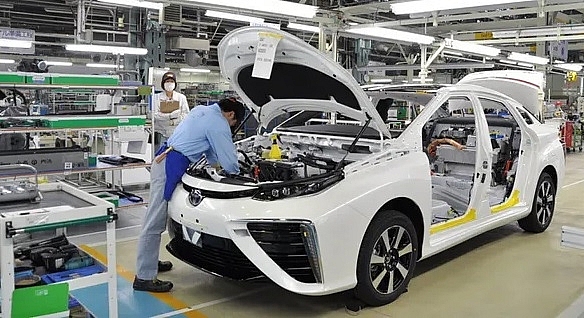SCT exemption for localisation
 |
| Vu Tan Cong |
Following the proposals of the Ministry of Industry and Trade (MoIT), the Ministry of Finance (MoF) has proposed to the government and National Assembly to amend some articles of the Law on Special Consumption Tax (SCT) for automobiles. As per the proposals, there will be no SCT on locally-created costs of locally-manufactured automobiles.
If the proposal is approved by the National Assembly meeting set to take place next month, the price of locally-manufactured automobiles will reduce greatly thanks to lower SCT charges, leading to a huge opportunity for local manufacturers and supporting industry manufacturers.
Currently, the SCT-calculated price of automobiles is determined by their sales price without value-added tax by manufacturers for local automobiles and by importers for imported vehicles.
Today passenger cars, pick-ups, and buses with fewer than 24 seats are subject to SCT, with the rates being the same for both locally-manufactured and imported vehicles. For passenger cars, rates are based on vehicle engine displacements, as the bigger the vehicle engine displacement, the higher the rates are. For pure electric vehicles, SCT rates are much lower than those with internal combustion engines.
Strengthening local manufacture
Realising that this policy will enable local automobile manufacturers to raise the localisastion ratio, reduce the price of vehicles, and improve the competitiveness of locally-manufactured vehicles against imported ones.
However, according to the ASEAN Trade in Goods Agreement, import tax rates on automobiles from other ASEAN members from January 2018 are zero if these imported vehicles reach 40 per cent in-block localisation ratios or more.
Thanks to these non-existent import tax rates, the selling price of imported vehicles are decreasing sharply. As a result, the SCT amounts on imported vehicles are much lower than the same locally-produced ones. Accordingly, prices of automobiles imported from other ASEAN countries are more competitive than locally-produced ones, which may threaten the development of the local automobile industry.
Solutions on supporting the local automobile industry, however, may violate World Trade Organization commitments and rules. To avoid this, the proposed policy is advised to be valid only for a short 4-5 years. Through this period, the Vietnamese automobile support industry will have enough time to develop.
In order to take advantage of the upcoming amended Law on SCT, local automobile manufacturers will have to use local parts and components for their vehicle assembling. This opens the market for the local automobile supporting industry (part-component manufacturing) enterprises (Tier1s).
Some of the current Tiers1s that may be capable of taking these opportunities include Hanoi Mechanical Corporation and Hanoi Plastic Company, among others.
 |
| SCT exemption for localisation - illustration photo, source internet |
Currently, the Vietnamese automobile supporting industry is still undeveloped due to little market demand. Enterprises can produce automobile parts of large dimensions, low technology levels, and of low added value, such as tyres, glass, batteries, electric cable assembly, plastic parts, and bus and truck interiors.
Due to low demand, many private small- and medium-sized automotive supporting enterprises hesitate to make investments in manufacturing auto-parts and components. If the MoF proposal is approved by the National Assembly, auto-parts and component demands will increase, giving opportunities to Tier1s. In addition, the approval on the amended Law on SCT will create new price wars between local automakers and importers, benefiting consumers.
Seizing on the trend, local automobile manufacturer VinFast and plastics producer An Phat Holdings have co-operated to set up VinFast–An Phat Automotive Plastics Company to produce spare parts and accessories for cars and other vehicles. This venture expects to be one part of the automobile manufacture line of VinFast. In order to increase its ratio, VinFast established a localisation of about 30 per cent of the complex area in the northern port city of Haiphong to produce parts and accessories for cars and motorbikes.
When domestic automobile part-component demands increases, there will be more investors, both from home and overseas, making their investments in the local automobile supporting industry. In addition, existing supporting industry enterprises will make more investment in their businesses for more production volume and new technology transfer for higher added value.
With more investments and higher market demand, Tier1s will be capable to manufacture complicated hi-tech and world-class auto-parts, paving the way for them to participate in global automotive supply chains.
By doing so, the Vietnamese automobile industry will develop strongly, creating more jobs for people and providing great effects on socio-economic development, both in the short and long-term.
It can be seen that lower local vehicle prices are challenges for imported vehicles. Customers will prefer local vehicles thanks to better prices and little difference in vehicle quality. The best way for vehicle importers to survive is to reduce prices, which would benefit automobile consumers.
By Vu Tan Cong - Permanent deputy general director, Vietnam Car Industry and Trade Consulting Co., Ltd.
What the stars mean:
★ Poor ★ ★ Promising ★★★ Good ★★★★ Very good ★★★★★ Exceptional
Themes: Unleashing The Private Sector
Related Contents
Latest News
More News
- Kurz Vietnam expands Gia Lai factory (February 27, 2026 | 16:37)
- SK Innovation-led consortium wins $2.3 billion LNG project in Nghe An (February 25, 2026 | 07:56)
- THACO opens $70 million manufacturing complex in Danang (February 25, 2026 | 07:54)
- Phu Quoc International Airport expansion approved to meet rising demand (February 24, 2026 | 10:00)
- Bac Giang International Logistics Centre faces land clearance barrier (February 24, 2026 | 08:00)
- Bright prospects abound in European investment (February 19, 2026 | 20:27)
- Internal strengths attest to commitment to progress (February 19, 2026 | 20:13)
- Vietnam, New Zealand seek level-up in ties (February 19, 2026 | 18:06)
- Untapped potential in relations with Indonesia (February 19, 2026 | 17:56)
- German strengths match Vietnamese aspirations (February 19, 2026 | 17:40)

 Tag:
Tag:




















 Mobile Version
Mobile Version